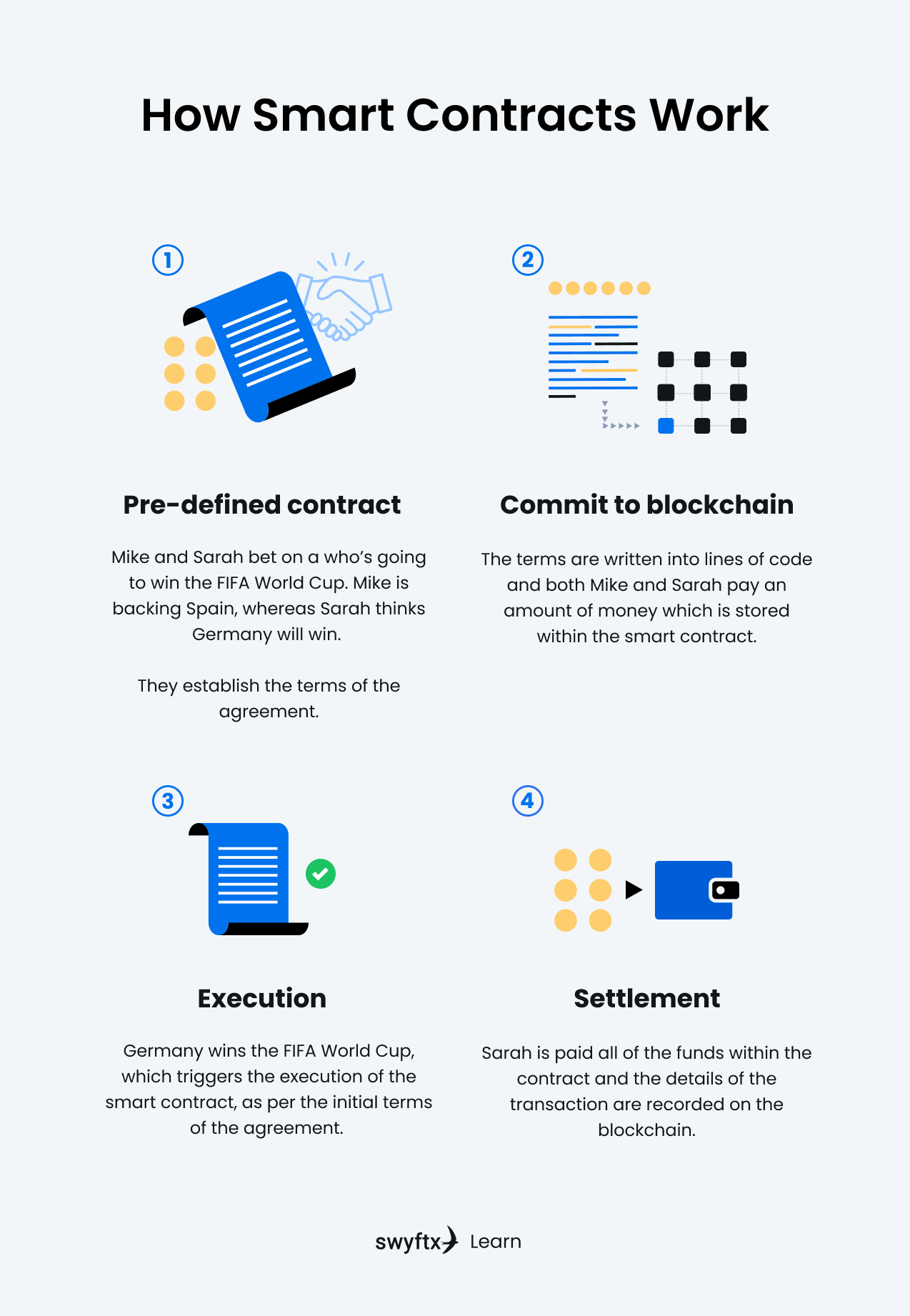
We use contracts all the time in everyday life. Whether it’s for buying a house, securing payment, or even getting married; contracts are necessary to outline the process and obligations involved in an agreement. They have worked for decades to ensure that what is supposed to be done in any circumstance will be executed as planned. Smart contracts are very similar, but they are executed using computer code, rather than a third-party intermediary. This article will discuss the difference between a conventional and a smart contract. It will then delve into how smart contracts work, what platforms can run them, and which industries are most affected by smart contracts.
Regular contract vs. smart contract
Conventional contracts and smart contracts essentially do the same thing. They detail a process and explain the rules that come with it. They also explain what happens when these rules are followed or not. The main difference is that conventional contracts must have a centralized third party verify the contract whereas a smart contract uses computer software that implements these detailed guidelines by itself. It does this based on the lines of computer code written for it. Below is a comparison of the main differences between the two types of contracts.
| Conventional Contract | Smart Contract |
|---|---|
| Outlines guidelines for how something is intended to work | Outlines guidelines for how something is intended to work |
| Cannot be changed once signed | Cannot be changed once created |
| Is a document that lives on as a computer file or in print | Is a computer software that lives on a decentralized blockchain network on multiple computers |
| Requires a third party to implement the rules | Can implement the rules on its own |
How does a smart contract work?
Smart contracts were first brought to light in 1997 by Nick Szabo, a computer scientist, legal scholar, and cryptographer who worked towards bringing law contracts to the electronic commerce space. The smart contracts he created had triggers set up within their code so that when specific actions occurred, it would automatically allow the next action to happen.
Nick Szabo used vending machines as an example to show how a simple smart contract model works. For example, someone inserts the correct coins into the machine, selects a button from the keypad, and the item in the corresponding slot is dispensed.
This is a useful example, but it only works with one machine. When you put a smart contract onto a blockchain platform, the code is distributed throughout computers all around the world. It is here where we can set up complex and detailed smart contracts in the real world to run important systems. When we put a smart contract onto a blockchain platform it also allows the actions to be transparent, tamper-proof, and more cost-effective than before.

Figure 1 – How smart contracts work
What conditions does a smart contract include?
As simple instances of logic, “if/when…then…” statements are written into code on a blockchain to make smart contracts function. When predetermined conditions are met and tested, the activities are carried out by a network of computers. These activities could include transferring funds to the proper parties, registering a car, sending notices, or issuing a ticket.
Important to Remember
When a smart contract transaction is complete, the blockchain is permanently modified. The transaction can’t be reversed, and the results are only visible to those who have been given permission.
There can be as many stipulations as required in a smart contract to ensure the participants that the task will be performed satisfactorily. Participants must agree on how transactions and their data are interpreted on the blockchain, agree on the “if/when…then…” rules that regulate certain transactions, discuss all possible exceptions, and create a mechanism for resolving conflicts in order to develop the terms.
What industries will smart contracts affect?
Many industries will be affected by the mainstream adoption of smart contracts. Very few industries are exempt from needing a contract of some sort. Think about any industry that requires data to be stored — there’s a lot. Smart contracts are revolutionary for data management as they leave very little room for error and corruption in comparison to humans controlling these systems in the past. Below are some industries that could effectively utilise smart contracts.
- Insurance policies. Faster to process policies and easier to avoid fraudulent claims.
- Medical records. More secure way to store sensitive data.
- Elections. More accessible voting and efficient validation for voters’ identity.
- Supply chain management. Improves traceability and verifies business transactions.
Which blockchains can run smart contracts?
Although Ethereum is the blockchain most often associated with smart contracts, many of today’s blockchains have the ability to create and execute smart contracts. Here are a few of the most popular.
Ethereum
Ethereum (ETH) was the first smart contract platform and remains the most popular blockchain for smart contracts and decentralized applications (dApps). The Ethereum blockchain allows developers to run smart contracts as an Ethereum account. To run a smart contract on the Ethereum network developers must be able to code in Ethereum’s own programming language, Solidity, and have enough ETH to cover the gas fees involved in deployment.
Did You Know?
Over one million smart contracts have been deployed on the Ethereum network, holding over 100 million ETH!
Chainlink
Chainlink (LINK) actually runs on Ethereum, but it adds the feature of linking off-chain oracle nodes. This means Chainlink can translate data from the real world to the blockchain which allows for even more opportunities for smart contracts on the blockchain.
Cardano
The Cardano (ADA) blockchain uses a coding language called Haskell to build its smart contracts, which are best suited for organisational and financial applications in the business world.
Uniswap
Uniswap, like Chainlink, runs on the Ethereum blockchain. It is one of several decentralized exchanges (DEXs) that rely almost entirely on smart contracts to perform trades without the involvement of a third-party intermediary.
Smart contracts in the real world
In the real world, you probably won’t even notice a smart contract is being used. All you will notice is a system that works efficiently, and which has virtually no room for error as it runs on smart contract code. It’s hard to believe that all of these systems have been performed by hand for so long. Smart contracts are a significant step forward in this regard, and they are still in their infancy. It is likely that smart contracts will grow and evolve into something even greater in the years to come.
Wrap up
Smart contracts are executed using computer code, as opposed to conventional contracts that use a third-party intermediary, such as a lawyer. This article looked at how smart contracts work, what platforms can run them, and the industries that will be most affected by smart contracts. If you would like to learn more about Ethereum, or anything else related to cryptocurrency and blockchain technology, check out Swyftx Learn for plenty more great content!
Disclaimer: The information on Swyftx Learn is for general educational purposes only and should not be taken as investment advice, personal recommendation, or an offer of, or solicitation to, buy or sell any assets. It has been prepared without regard to any particular investment objectives or financial situation and does not purport to cover any legal or regulatory requirements. Customers are encouraged to do their own independent research and seek professional advice. Swyftx makes no representation and assumes no liability as to the accuracy or completeness of the content. Any references to past performance are not, and should not be taken as a reliable indicator of future results. Make sure you understand the risks involved in trading before committing any capital. Never risk more than you are prepared to lose. Consider our Terms of Use and Risk Disclosure Statement for more details.

 Article read
Article read




